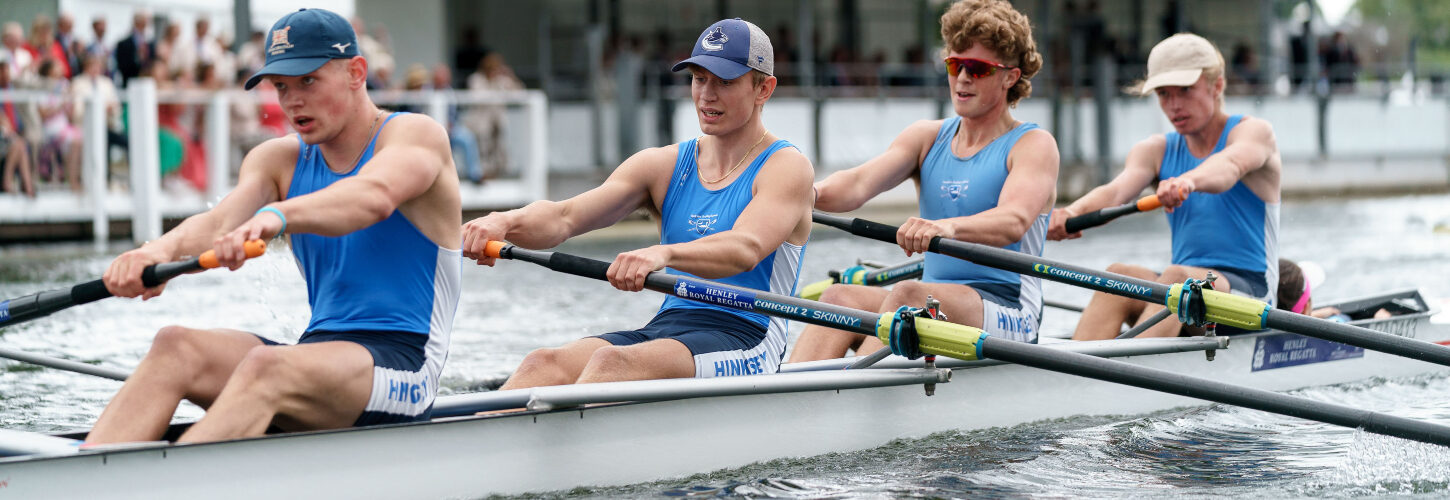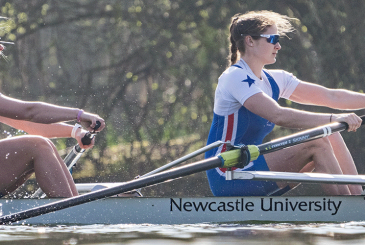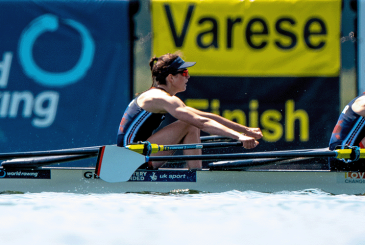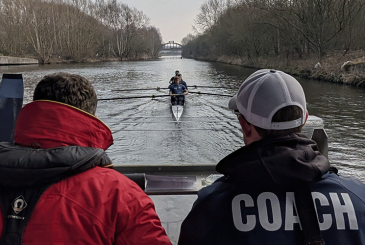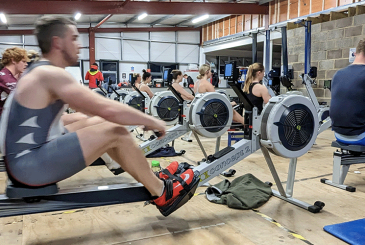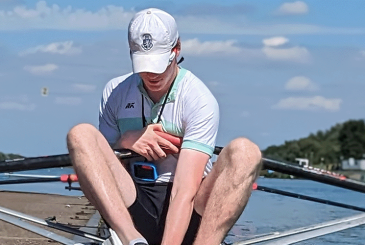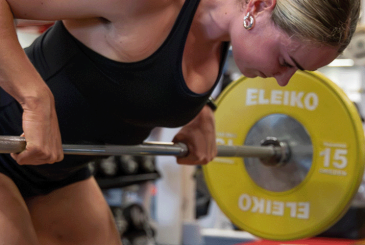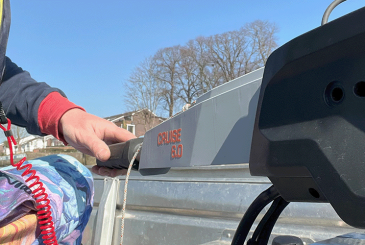After 20 years of teaching the young people of Oxford to row, Hinksey Sculling School hit the headlines this summer with a crew reaching a Henley final for the first time in August. Martin Gough finds out more
A few months on from a unique Henley Royal Regatta, plenty of memories still burn bright. One highlight of the event, though, stands out because it was so unexpected.
Even the regatta website’s own preview made no mention of Hinksey Sculling School, whose combination of 17 and 18-year-olds – pictured above – proved to be the best British club coxed four in reaching the final of the Britannia Challenge Cup.
They were unable to overturn the four from Frankfurt in the final, but they had already beaten senior opposition from storied clubs such as Marlow RC and, in Saturday’s semi-final, London RC.
“I’ve never been that nervous for my own races,” recalls crew coach James McAnallen, a former Under-23 world championship medallist from New Zealand, who was watching from the Stewards Enclosure.
“Seeing them come past with that lead and the way they were rowing was fantastic. They had pulled off something remarkable.”
A community rowing club, set up in Oxford just over 20 years ago, Hinksey Sculling School had never even qualified for the Royal until 2019 but this summer they pre-qualified three crews and a further three made it through qualifying races, although one subsequently had to withdraw because of an error in the entry.
Also racing in a senior club event, their coxless four reached the second day of the regatta and their junior women’s eight also won on day one, going on to meet Headington School, of which more later.
“We have really been pushed to survive but seen the opportunity in it to move the programme forward”
The architects of this recent revival began work at Hinksey together in September 2018. Head coach Axel Dickinson continued to contribute to the programme even though he was stuck at home in New Zealand during the second Covid-enforced lockdown.
Meanwhile the focus of German director of rowing Bodo Schulenburg was as much off the water as on it. He says of the programme: “Most of the positive developments have been because of crisis management.
“It has been a lot of work to get to this stage. We have really been pushed to survive but seen the opportunity in it to move the programme forward.”
For example, the club were left without a land-training base when the school they had used for 10 years gave them notice to quit.
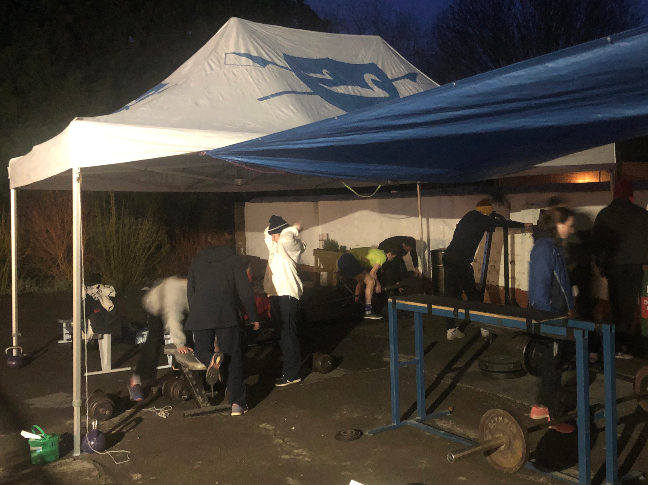
“We had to think on our feet and decided to convert the original Hinksey site in a community centre from sculling boat storage into a gym facility,” says Schulenburg.
“It was really bare bones – it looks like a garage still – but that was the first step because it meant we could train 24/7.”
Lockdown meant bodyweight circuit sessions six times a week on Zoom, and a desperate search for ergos to loan to leading athletes. They secured some second-hand machines used by the GB team for altitude training.
“I’m certain we have offered a huge chunk of our membership an opportunity they wouldn’t even have thought about”
As recently as last spring, competitive rowers could only train on the water at weekends, as guests of either St Edwards’ School in Godstow or of Radley College. Recently they have managed to negotiate some extra hours and the coxed four in the final was a borrowed Radley boat.
The Hinksey coaching team visit local schools, teaching pupils in Years 7 and 8, while the club still takes on beginners of any age between eight and 18.
Not all Hinksey’s older athletes are home-grown, Schulenburg explains: “We have some athletes who have been rowing with us since they were nine years old. Others joined from neighbouring clubs.
“Quite a few people noticed what we were doing and switched clubs or gave up rowing for their school to come to us.”
Driving the recent improvement in results has been a desire to allow rowers to explore their potential, for example by securing scholarships to row and study at American universities. All eight of the top boys had offers to consider from the US after Henley.
“There are so many community charity clubs that are doing a really good job of letting people participate in rowing, but for me, I think you need to go a step further,” says Schulenburg.
“At first we looked at the life skills: you learn to take one area of your life very seriously and that then translates to anything you do. That benefits your schoolwork as well as your rowing.
“But if you look at who benefits from rowing, it tends to be [for] the rowers who are really successful. Then, rowing is a door-opener. People row well and then opportunities in education will present themselves, which normally they wouldn’t have had.”
Schulenburg says that rowing has always been a big part of his life – his first experience of the sport came at the age of five and he went on to become a junior international.
“My own career was cut short because of a physiological condition, so I didn’t get to achieve what I wanted to,” he says. “In my mind I stopped rowing in 2003 at the latest. Everything I’ve done since was getting dragged back into it.”
He was “dragged back in” to row in three lightweight boat races – winning two – and to coach a further three from 2013-15 before taking on a role developing rowing in Hong Kong.
“What we meant to do there was to set up something like a Leander for Asia, with a new regatta course and a high-performance centre for various Asian nations,” he says.
“Literally, the day I landed the funding was slashed but we set up a charity, similar to Hinksey, for disadvantaged youths and managed to teach close to 600 kids to row in our first year.
“It was a challenge and a half to get it set up, but it taught me a lot of things that I can now apply at Hinksey.”
“What we’ve seen this year is really just the starting point because what’s coming through the ranks looks even more promising”
After a year-long sabbatical working as a chef in fine dining, Schulenburg returned to Oxford three years ago, aiming to put the cherry on Hinksey’s cake, which has always boasted strong numbers but rarely J18 results to match.
The club was set up on Hinksey Lake, just south of the Oxford city centre, by friends John Broadhurst and Tom Collins in 1998. They had done a similar job at Headington School seven years earlier, roped in to coach as parents with rowing experience when a teacher offered the sport for the first time.
“While we were coaching Headington youngsters on the lake, so many people walked by and said, ‘Can I have a go, guv’nor?’ and we had to say no because it was a private club,” recalls Broadhurst, who remains club chairman.
“Tom and I decided there might be a need in the community. “We started with about 20 members, largely offspring from City of Oxford members, we had a few boats that Headington turned over to us and it just happened from there.”
“I think a fair proportion would not have picked [rowing] up. I’m certain we have offered a huge chunk of our membership an opportunity they wouldn’t even have thought about.”
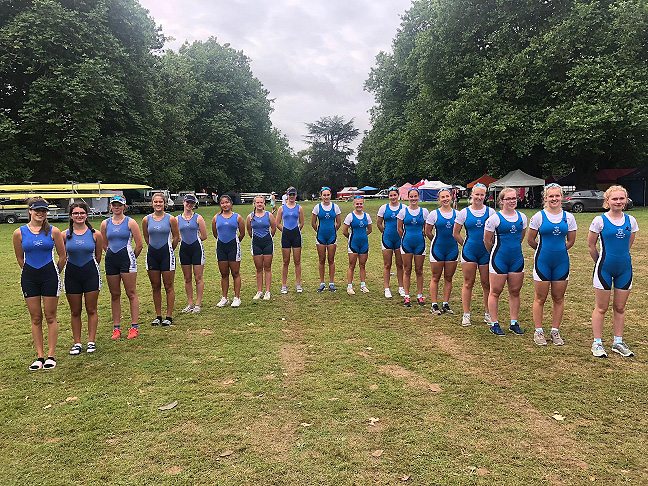
Sadly, Collins died 18 months before Headington and Hinksey met in the second round of the inaugural event for Junior Women’s Eights at Henley, but Broadhurst says: “I suspect he was smiling from up above. It was indeed a moment – unbelievable.”
Six of those Hinksey girls appeared at the Great Britain U19 long-distance trials earlier this month, ratifying Schulenburg’s belief that the girls’ squad will now step out from the shadow cast by last year’s boys’ performances.
“On the boys’ side I think we had a once-in-a-decade intake, we got really lucky,” he says. “We might not have as big a boys’ squad next year – the girls’ numbers are huge.
“What we’ve seen this year is really just the starting point because what’s coming through the ranks looks even more promising.
“We will feature at Henley I think quite regularly from now on and we’ll stay on until we manage to win one of the big races.”
Meanwhile, off the water, plans are afoot to build a new boathouse on the Radley stretch, a 10-minute bike ride from the city centre, which would allow more water time for competitive athletes and for their outreach programmes for athletes with disabilities.
The understanding that has been there from the beginning remains strong. “Our doors are always open,” says Broadhurst. “If we’re out on the pontoon and someone walks up and wants to have a go, they can. We’re very keen for that to happen.”
What would the club’s co-founder like to see from the future?
“An Olympian perhaps, eventually, but in the meantime why not a Hinksey/Headington final at Henley?”
Main photo: AllMarkOne


